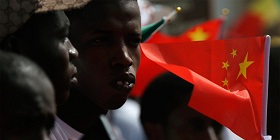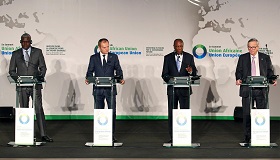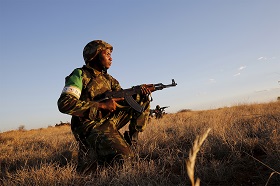During the peak of the Soviet Union, there was no contestant to the powerful influence the superpower held in Africa. The 1970s were marked by the USSR’s active support of the African liberation fight, which allowed the Soviet Union to export the socialist ideology. It was during this era that diplomatic ties were established. The active involvement was fueled by considerable Soviet financial, technological, social and military aid to the continent. The Soviet Union’s role in the African fight for independence formed a bond Africa is yet to recapture with any other global power since then.
The collapse of the Soviet Union marked the beginning of a new era in Russian-African relations. After the dissolution of the USSR and “perestroika,” Africa slowly slid off the Russian political agenda.
During the following years, Russian presence on the continent was mainly limited to raw material export and military cooperation. The turnover year was 2010, in which South Africa joined BRICS, marking a heightened mutual interest in political cooperation. On the 24th of December 2010, South Africa officially became a member of the bloc and, once again, building stronger political, economic and social ties with Russia took center stage.
The period between 2010 and 2018 was marked by several important events for the African continent and bilateral Russian-African relations.
As the Ebola epidemic gained momentum in Guinea, Liberia, and Sierra Leone, Russia became one of the first countries to provide help, jointly with the Ministry of Emergency Measures, sending a group of Russian medics to Guinea to set up mobile hospitals in August 2014. Throughout the epidemic, more than 90 Russian specialists were stationed in Guinea, whilst more than 100 interned on the spot and went on to continue their work in other local medical institutions. On the 9th of August 2017, Russia revealed the world’s first Ebola vaccine, the “Gum Evak-Combi,” which was tested on 2000 volunteers and was deemed a success. Russia spent approximately 60 million US dollars in the fight against Ebola.
The head of the African Commission, Nkosazana Dlamini-Zuma, praised Russia during a meeting with the Chairwoman of the Russian Federation Council, Valentina Matviyenko, expressing gratitude for Russia’s assistance in the fight against Ebola. “We now understand the importance of tight cooperation in such cases. We can do more together.” Continuing the positive discourse, Ms. Dlamini-Zuma and the Russian Foreign Minister, Sergey Lavrov, signed a memorandum of understanding in September 2014, on behalf of the African Commission and the Ministry of Foreign Affairs of Russia.
Russia’s role in the Sudanese conflict was of no less importance. On the 13th of June 2018, the US initiated a UN Security Council Resolution to impose an arms embargo on South Sudan, as well as personal sanctions directed at two South-Sudanese nationals, limiting travel rights and freezing accounts. Despite six Security Council members, including Russia withholding from voting, the resolution was adopted. Acknowledging the progress achieved in the country, first and foremost as a result of joint efforts of neighboring states, Russia along with the African Union and the Intergovernmental Authority on Development (IGAD) supported the opinion that the measure was ill-timed and counter-productive. Apart from that, Russia has always voiced support for South Sudan, encouraging the country to maintain good relations with neighboring states and foster democratic processes. During his speech during the official UN Security Council meeting on Sudan in New York in June 2011, M. Bogdanov, the Russian Deputy Minister of Foreign Affairs, stated that Russia has always supported the sovereign will of the South-Sudanese people, therefore exerted no pressure on any involved parties and underlined the fact that the fate of a country shall be determined solely by its people.
Russia later supported UN Security Council Resolution 1996 on the deployment of a UN mission to South Sudan to ensure peace and security and to help facilitate the nation-building process.
Trilateral talks between the foreign ministers of Sudan, South Sudan and Russia were held in 2015 in Moscow by Russian initiative. The key goal of the talks being the normalization of relations between the two African states, the parties discussed the realization of the 2012 peace agreements, as well as the road map and cooperation protocol. All parties agreed upon the progress made within the framework of the trilateral format, seen as complementary to the peace-keeping operations and mediation mechanisms in the region used by the African Union and other international bodies.
Russia additionally continues to relieve the debt burden of African states, with more than $20 billion having been written off to date. Bilateral agreements have been signed between Russia and Zambia, Madagascar, Mozambique, and Tanzania within the framework of the “debt-for-development” program.
The beginning of a new era of deeper Russian-African relations was seen during the 2018 BRICS Summit in South Africa, when Vladimir Putin gave a new impulse to deepen ties by inviting the African political and business elite and integration structures to Sochi for the first Russia-Africa Summit in October 2019.
As Russia prepares to open its door to Africa’s most prominent leaders, activists, businessmen and policy makers determining the nature, the benefits and prospects of a Russian-African partnership has come to the fore.
First and foremost, African economic growth means new trade opportunities for Russia – new technologies may potentially provide innovative solutions for problems the continent faces today. As of 2017, the Russian capital’s non-resource export was $9.9 billion, with $1.6 billion from the sale of IT products, $1.3 billion - mechanical equipment, $662 million - electric equipment and $315 million - optical and medical instruments. The push to increase exports has led Russia to actively search for opportunities to intensify technological development and move away from a predominantly resource-based export structure. Otherwise, African markets could serve as part of the cure of Russia's Dutch disease.
Considering Russia’s major role as a major player in energy markets, energy security may become a principal area for cooperation today. Russian nuclear technology offers a possible solution for Africa’s energy deficit. As seen in the case of Uganda, where in 2017 only 26% of the population had constant access to electricity, ensuring a safe and secure energy supply is an imperative step in bolstering the economy. Having heavily invested in alternative energy sources and having built multiple hydroelectric power plants around the country, Uganda found itself at the mercy of drought and increasingly unpredictable weather conditions, which inevitably leaves the bulk of the population with limited access to electricity during off-peak seasons. Russian nuclear plants could provide stability, as well as a more sustainable and eco-friendly option compared to traditional sources such as coal, gas, or oil.
Another interesting field of economic and trade cooperation would be the strengthening of military ties between Russia and Africa. Over the past three years, several bilateral agreements, to export military hardware to 15 African countries, have been signed. It was announced by the Russian Deputy Minister of Defense that negotiations are currently being held with other six countries. To a large extent, future development and the prosperity of the African continent largely depend on guaranteeing stability and safety, which is why the matter of strengthening national armies is a continental priority. As announced by the director of the Russian Federal Agency for Military and Technological Cooperation, Mr. Shugaev, in September 2018, Sub-Saharan African states have ordered military equipment worth $3 billion. Shugaev went on to announce that Russia is ready to provide loans to Sub-Saharan states interested in purchasing Russian equipment.
Since the Soviet era, humanitarian cooperation remains an important vector of the partnership. Education plays an important role in the Russian-African partnership. Russia, a traditional leader in medicine, mechanical engineering, and energy, has been offering young Africans quality education in important sectors for their national economies for years. In 2014 only 56% of the Mozambican population over the age of 15 was considered literate according to the World Bank Development Indicators, with that number being slighter more promising in Angola at 66%. During the Russian Foreign Minister’s visit to Angola, Namibia, Mozambique, Zimbabwe, and Ethiopia in spring 2018, almost all leaders underlined the importance of further investment in the education of African students completing degrees in Russian universities.
Perhaps one of the most important fields to be mentioned, when contemplating a Russian-African partnership, is the continent’s agricultural potential. More than 60% of the Sub-Saharan population is smallholder farmers, whilst 23% of the region’s GDP derives from agricultural industries. Nevertheless, according to the 2019 Mckinsey report, “Winning in Africa’s agricultural market,” the continent’s full agricultural potential remains untapped. It was determined that Africa could double or even triple its production of cereals and grains, and therefore boost the global output by 20% by increasing productivity. Among other things, heightened productivity in Sub-Saharan Africa requires eight times more fertilizer. This reveals an interesting point for strategic cooperation. Russia’s structural dependency on oil and gas industries opens the way for the development of subsidiary industries. In this particular case, considerable O&G production has meant hefty exports of fertilizer as a key by-product. Russia is ranked among the top five suppliers to the international market, and the country’s export volume is set to grow as production capacity over the next eight years outweighs domestic consumption. Fertilizer production in Russia has been steadily growing by 3.35% annually over the past seven years, from 2010 to 2017, according to Russia’s Federal State Statistics Service. In March 2018, a fertilizer industry development plan was adopted by the Russian government, putting forward a national goal to increase production by 5.5 million t (2.76%) annually by 2025.
The political aspect of cooperation is of considerable interest, particularly for Russia, as Moscow continues the search for strategic partners. Having felt the burn of Western sanctions, Russia was forced to look elsewhere for new global partners. African countries could offer their support to the Russian Federation in international platforms, such as the UN General Assembly, UN Security Council and other international bodies to those initiatives that are usually shot down by Western countries, which pursue an anti-Russian agenda. With potentially 54 additional votes to offer in slightly over a fourth of all UN members, Africa could provide a much-needed political boost for Russia, swaying decisions and helping the country to achieve more tangible results in its pursuit for new multipolar world order.
Furthermore, the complicated and ambiguous nature of China’s presence in Africa has nudged the continent towards Russia’s open arms, leading to a more trustful relationship between the parties. The broad gap between expectations and reality of the Sino-African partnership has led to mass distrust and disappointment amongst locals, who now fear a new era of Chinese economic colonialism on the continent. The fond memory of Soviet support provides Russia with a favorable reputation giving way to new opportunities in the area of trade, economic and political cooperation.
As in every partnership, it is of importance to note what both sides could bring to the table. Therefore, mentioning African best practices in the fields of integration and payment systems is imperative while analyzing Russian-African cooperation.
During the 2012 African Union Summit in Addis Ababa, two important events took place, namely the adoption of the Decision (Assembly/AU/Dec.394 (XVIII)) on the Establishment of a Continental Free Trade Area (CFTA) by 2017, and the endorsement of the Action Plan on Boosting Intra-Africa Trade (BIAT). BIAT identifies seven areas of cooperation, including trade policy, trade facilitation, productive capacity, trade-related infrastructure, trade finance, trade information, and factor market integration. Both the CFTA and the BIAT served as a stepping stone towards the future creation of Africa’s first free trade area, and the largest FTA the global economy has yet to see.
On the 21st of March 2018, the Agreement Establishing the African Continental Free Trade Area was adopted. The deal was brokered by the African Union and signed by 44 of its 55 member states in Kigali, Rwanda.
As of the 29th of April 2019, 22 African states ratified the Agreement meeting the minimum threshold of ratifications required for it to enter into force, thirty days after deposit of the twenty-second ratification, under Article 23 of the AfCFTA Agreement. The world’s largest FTA, with a market of 1.2 billion people and a GDP of $2.5 trillion, will enter into force on 30th May 2019.
The principle goal of the FTA is accelerating intra-African trade, as well as the strengthening of Africa’s trading position in the global market. With a population set to reach 2.5 billion by 2050, Africa will be home to 26% of the world’s working-age population and an economy estimated to grow double the speed of the developed world.
Currently, an average tariff of 6.1 percent means that businesses exporting within Africa pay higher tariffs than those trading with other continents. One of the key goals of the AfCFTA is the elimination of intra-African trade tariffs, helping enterprises benefit from the surging market. According to the Economic Commission for Africa (ECA), the AfCFTA could boost intra-African trade by 52.3%.
Practically speaking, the AfCFTA opens the door for the abolishment of tariffs on a wide range of goods being traded within Africa; the creation of a mechanism for the removal of trade barriers; cooperation between customs authorities over product standards, regulations, trade transit and facilitation; the progressive liberalisation of services; mutual recognition of standards, licensing and certification of service suppliers and other clear trade benefits for the African continent.
The ability to maintain the free flow of goods and services largely depends on the free movement of financial flows across the continent and free convertibility between African currencies.
With the amount of transactions denominated in dollars in Africa from 2013 to 2017, dropping by 6% to 45.1% of total transactions, the significant positive dynamic has been achieved. Local currencies are being used more frequently, with the continental leaders being the West African franc and South African rand. The African Development Bank actively supports de-dollarisation initiatives, including the East African Payment System and the West African Monetary Zone’s project to link payment systems. Also, Afreximbank, a Pan-African Multilateral Financial institution, headquartered in Cairo, is in the process of establishing a Pan-African Payment and Settlement Platform (PAPSP), set to lower transaction costs and to facilitate informal cross-border trade, currently estimated at $93 billion.
These efforts may serve as a source of inspiration and best practices for the Eurasian Economic Unions (EAEU) as it actively lobbies for the de-dollarisation of its intra-trade. Here, Africa’s case could be of value.
It is worth noticing the range of African countries that have the potential to serve as interesting case studies for Russia in the area of decreasing natural resource dependency. Mauritius successfully transitioned from a sugar-dependent economy to a regional financial services hub. Botswana continues to diversify its economy and promotes itself as a diamond cutting and polishing center. Rwanda is gracefully transforming into an innovative and technological hotspot, while Ethiopia is set to become a central manufacturing hub.
A Russian-African strategic partnership shows little promise of short-term returns, but gives strong signs of long-term, mutually beneficial investment. With the acceleration of economic development and the increase of intra-African trade up to 25% by 2025 as expected under the auspices of the African Union’s Agenda 2063, a Russian-African partnership could unite two emerging global forces. In October 2019, African and Russian leaders and business elite will meet in Sochi to discuss how exactly to harness the partnership’s full potential.







